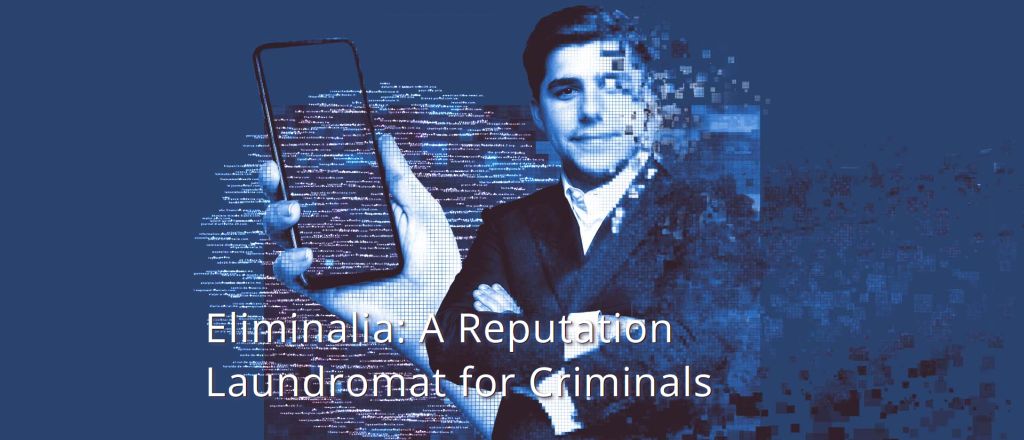When fake claims suppress the news - and a victory for books
Copyrights and wrongs
MEMBERS have been contacting the Freelance about claims that copyright law is being used to suppress journalism and free expression in general. In a sense, it is being abused in that way - and a mid-March seminar organised by the European Federation of Journalists demonstrated that that sense is far more interesting - and terrifying - than some of the complaints suggest. There is, though, potentially major victory for copyright in the US.

Eliminalia: A Reputation Laundromat for Criminals an OCCRP investigation
The line that evil authors who want to say when our work can be used are somehow practising "censorship" is still surprisingly popular. It taps into the response of a teenager whingeing that they can't get everything they want online, for free, right now. And reports that tap into that are likely to be well-funded by the likes of Google and Facebook, two of the corporations that want to get everything that's online, for free, right now.
The very worrying thing that is happening concerns "reputation management" companies. These cater to the wishes of the very rich or quite corrupt to conceal anything that might diminish their reputation. One, the Spain-based Eliminalia, charges €2000 per link that it gets removed from the Web or search engines. A lawyer for one of its clients observed to Kira Zalen, investigative editor with the Organized Crime and Corruption Reporting Project, that that's cheap: other clients were paying retainers of £30,000 to £40,000 per month to other reputation management firms.
Eliminalia mostly uses two legal tools to hide its clients' embarrassment. One is EU "right to be forgotten" law and case-law. The other is the US Digital Millennium Copyright Act (DMCA).
And how do "reputation management" companies use US copyright law? First, they breach news organisations' and journalists' copyrights to create fake news websites.
Second, they post to those sites hacked-up versions of stories they want to suppress - doubly breaching copyright by falsely claiming authorship of a story, backdated before its real authors published it.
Third, they issue "takedown notices" against the hosts of the real stories, offering the fake stories as evidence. Often these notices give the impression of coming from expensive law firms. Usually the fake stories are edited to remove actual information about their shy clients.
The DMCA does provide a mechanism to appeal falsified takedown demands. But a web-hosting company is likely simply to remove a page, without telling its owner. So there's no effective appeal against such a purely commercial decision not to resist.
The strange nature of US copyright law abets this underhand practice. In almost every other country, copyright and authors' rights laws offer recourse to authors when someone else claims our work. The US government insists that its laws cover this through the law of "passing off" - some of which is closer to consumer protection. Bringing such a case will be expensive - but ways to fund it need to be explored.
Mass bounceback
Italian journalist Lorenzo Bagnoli told the seminar that they'd managed to get 200 of those literal "fake news" sites taken down. But then Eliminalia created an offshore subsidiary that created 600 more to replace them.
The same problem of web hosting companies taking the cheapest way out applies to abuse of EU "right to be forgotten" law. Lawyer Dirk Voorhoof pointed out that this law has many legitimate uses. When abuses have been challenged the courts find in favour of freedom of expression. But that takes years - while compliance with an illegitimate demand takes seconds. A court challenge costs tens of thousands of Euro at least; the act challenged costs pennies.
That problem of timescales and costs is at the heart of very many issues about technology and law, particularly technology companies that want to get away with illegitimate or plain illegal behaviour until it is normalised and their lobbying to make it legal can succeed.
And, in that context, the likes of Google and Facebook are not sorry to see copyright law or privacy law abused. Compliance with the law would cost them a great deal of money. Allowing others to bring the law into disrepute can save them a great deal.
A similar asymmetry applies to Strategic Lawsuits against Public Participation (SLAPPs). The EFJ workshop was part of a series examining policy to deal with these.
Meanwhile in the Americas...
On 24 March a US court granted summary judgment to publisher Hachette (and others) against the Internet Archive (IA) for scanning print copies of the books and "lending" the digital copies. Judge John G. Koeltl in the Southern District of New York observed that "What fair use does not allow... is the mass reproduction and distribution of complete copyrighted works in a way that does not transform those works and that creates directly competing substitutes for the originals. Because that is what IA has done."
The IA will seek to appeal. This announcement was predictably greeted with more of that anti-copyright rhetoric.
And in Canada the legislation to make Google and Facebook pay news publishers for the stories against which they make advertising profits remains in the Senate. Google responded on 22 February with a threat to stop listing news articles to users in Canada - the same tactic that it has used in Spain and Australia.
The law passed only Canada's House of Commons on 14 December. We regret the error in the previous Freelance.
 How fake copyright complaints are muzzling journalists BBC Africa on OCCRP investigations
How fake copyright complaints are muzzling journalists BBC Africa on OCCRP investigations
 Eliminalia: A Reputation Laundromat for Criminals an OCCRP investigation
Eliminalia: A Reputation Laundromat for Criminals an OCCRP investigation
![[Freelance]](../gif/fl3H.png)